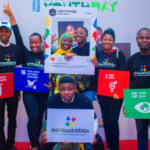A mix of vaccines, regulatory reforms, and grassroots mobilisation is giving Nigeria a fighting chance against one of its deadliest cancers.
Each year, 12,000 new cases of cervical cancer are recorded in Nigeria—with deaths reaching 8,000—ranking the country among the countries with the highest burden.
Today, an alliance—global partners, the federal government, and grassroots initiatives—is working to flip the script. The Human Papillomavirus (HPV) vaccination programme, launched two years ago, has since vaccinated 14 million girls, making Nigeria the largest contributor to HPV vaccine volumes worldwide.
Defeating cervical cancer with tech
Central to this vaccine campaign is the rapid influence of technology. Merck Sharp & Dohme (MSD), a multinational pharmaceutical company committed to improving health worldwide through the development and distribution of innovative healthcare solutions, is rolling out vaccines and therapies—advanced HPV vaccines and oncology treatment, including a respiratory syncytial virus vaccine for infants—that were previously out of reach for African countries
For long, Africa has suffered delays in receiving institutional approval for pharmaceuticals. Now, with the African Medicines Agency harmonising regulations, one submission can open doors in many countries at once.
This regulatory revolution is shortening timelines and bringing lifesaving treatments for patients of cervical cancer. This streamlined vetting process follows MSD’s long-standing partnerships with UNICEF and Gavi to make vaccines available at discounted rates.
Nigeria is also benefitting from long-standing disease control programmes that strengthen healthcare delivery systems, such as the Mectizan Donation Programme (MDP), which has provided free Ivermectin drugs to eliminate river blindness in the past three decades.
While its primary target is a different disease, the programme has built trust in medical interventions, enhanced distribution networks and fostered collaboration between governments, NGOs and local communities.
The lessons are now being leveraged to improve vaccine rollout and access to other innovative treatments, showing how existing health initiatives can serve as springboards for tackling newer challenges like cervical cancer.
In a similar vein, regional collaborations are breaking down bureaucratic walls, while private and public actors are beginning to share responsibility for health.
But the vaccination drive against cervical cancer is only the beginning of a long journey. Experts argue that protection must target women in their 20s, 30s, and 40s, including boys, who are carriers of the virus.
Misinformation as a threat
If technology pushes the country closer to ousting the disease, misinformation presents a hurdle. Rumours that the HPV vaccine causes infertility are still widespread in markets and on WhatsApp groups, even though there’s no evidence.
The emerging fear weakens years of progress, as many more shirk from being vaccinated.
This public reaction is not new. The decades-long fight against river blindness, supported by MSD’s free-medicine donation, succeeded not only because of science but because communities were engaged, educated, and empowered to trust.
The same formula must now be applied to cervical cancer. Regulators, healthcare workers, and community leaders must rally together to debunk these myths, translating clinical facts into simple language that the public can understand.
Nigeria’s vaccination feat seemed unimaginable a decade ago. Sustaining the momentum hinges on expanding vaccination to all genders and age groups, accelerating access to innovative medicines and building trust through strategic public education.
If these solutions are sustained, Nigeria can transform from one of the hardest-hit nations to a model for elimination.
Summary not available at this time.






